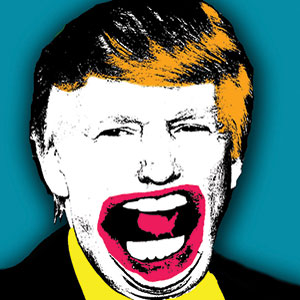One is considered boring, abstract, steeped in intellectual arcana and of interest only to a tiny subset of academics. The other is very much none of those things. But the study of rhetoric and Donald Trump are almost perfectly suited to each other.
So claims Ryan Skinnell in a new book called Faking the News: What Rhetoric Can Teach Us About Donald J. Trump. Skinnell, who teaches rhetoric at San Jose State University, has gathered together 11 essays from experts in the field of rhetoric to take on Trump.
If Trump is the Jedi master of commanding the loyalties of his fans and inflaming the animosity of his detractors through language and symbolism, then, says Skinnell, Faking the News is the guidebook on just how the president practices his dark arts.
“Regardless of where you fall on the political spectrum,” Skinnell says, “you cannot deny that the man has changed American politics fundamentally. Part of what the book is intended to do is to give people the language to talk about what we know is happening but can’t explain or describe.”
The book contains original essays by rhetoricians from across the country and examines Trump from a variety of different angles: his business career, his populism, his grasp of truth, his relationship with television, the internet and even golf. Skinnell says he brought together many of his colleagues and “I asked them ‘What is the book that every intelligent person needs to read about rhetoric and Donald Trump?’ Then, I just turned them loose.”
Skinnell says his book is, all things considered, fair to Trump. But the orientation of most of the authors in the book is to find the election of Trump distressing. From the standpoint of rhetoric, Trump regularly violated rules and norms that most political observers believed were sacrosanct. Even so, he was still able to attract enough support to win the White House.
Trump has given professional rhetoricians many compelling real-world scenarios to illustrate their concepts, and Skinnell’s students are eager to learn.
“In previous years, it was often a real challenge to get students interested in contemporary politics, even with Obama and other celebrity politicians,” he says. “Now, it’s the opposite effect. They’re interested, involved and invested, and therefore, they’re exhausted, because before they didn’t know enough, now they know too much.”
Faking the News
Out Now
Imprint Academic
trumpsrhetoric.com



